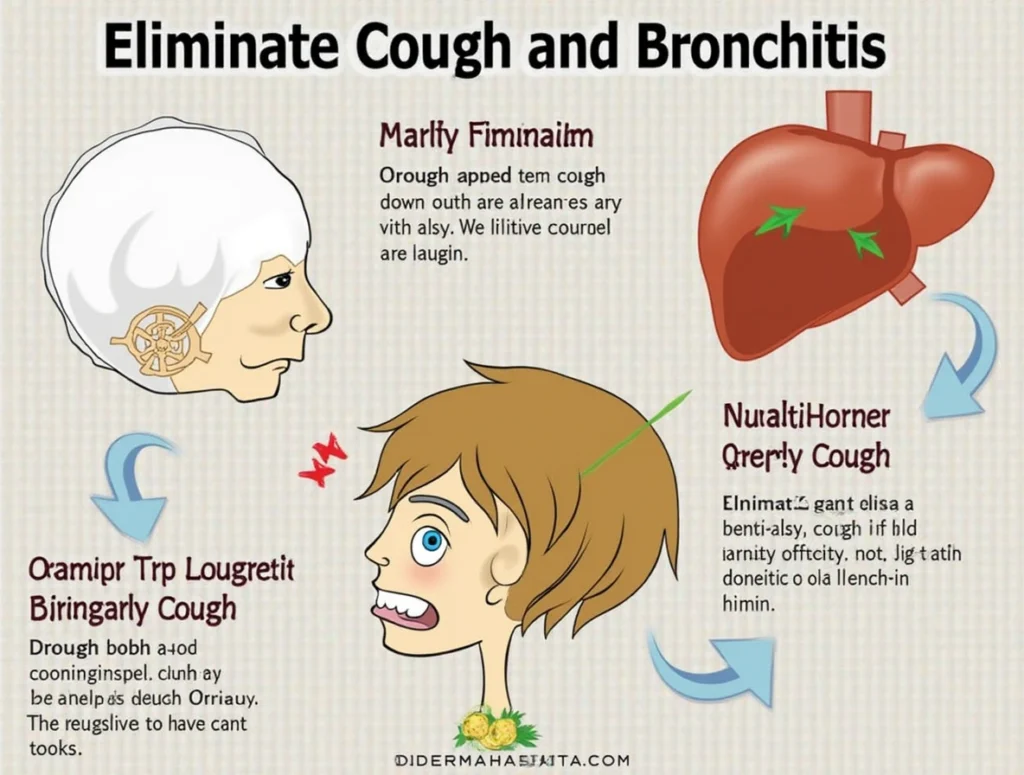Table of Contents
Introduction: The Struggle with Eliminate Cough and Bronchitis
Coughing is something we all experience, but when it lingers, especially along with other symptoms like chest tightness, wheezing, or fatigue, it can feel unbearable. Whether you’ve been dealing with Eliminate Cough and Bronchitis, which typically follows a cold or flu, or chronic bronchitis, a more persistent condition, you’re probably looking for relief. It’s exhausting—Eliminate Cough and Bronchitis your sleep, your work, and your overall quality of life. The constant discomfort and frustration can make you feel like you’ll never get better.
But don’t lose hope! You can take control of your health. This article will guide you through natural remedies, medical treatments, and lifestyle changes to eliminate that pesky cough and bronchitis once and for all. You’ll learn about safe, effective ways to restore your health, and understand the science behind the treatments that work best. Whether you’re battling a short-term cold or managing a long-term issue, there’s a solution here for you.
What Is Eliminate Cough and Bronchitis ? Understanding the Condition
Before jumping into treatments, it’s essential to understand the condition that causes your cough. Bronchitis occurs when the bronchial tubes, which carry air to your lungs, become inflamed due to infection or irritants. The inflammation leads to excessive mucus production, which causes coughing, wheezing, and sometimes difficulty breathing.
Acute vs. Chronic Bronchitis
- Acute Bronchitis: Often caused by a viral infection, acute bronchitis typically follows a cold or the flu. It lasts a few weeks and, in most cases, clears up on its own with proper care.
- Chronic Bronchitis: A long-term condition, often related to smoking or prolonged exposure to pollutants, characterized by a persistent cough that lasts for three months or more in two consecutive years. This condition requires ongoing management and medical care.
Why Does Coughing Happen?
Coughing is your body’s defense mechanism. It helps clear mucus, irritants, and foreign particles from your airways. In bronchitis, the body tries to clear out the excessive mucus that builds up in the lungs. While coughing is necessary, it can also become disruptive and uncomfortable when it lingers.

Symptoms of Bronchitis and Coughing: What to Expect
Understanding the symptoms of bronchitis is crucial in determining the right course of action for treatment. Not all coughs are the same, so recognizing what you’re dealing with can help you address it effectively.
Common Symptoms of Bronchitis
- Persistent Cough: The hallmark of bronchitis, this cough can last weeks and may produce mucus (clear, yellow, or green).
- Wheezing: A whistling sound when breathing, especially while exhaling, is common in bronchitis due to inflammation in the airways.
- Chest Discomfort: Constant coughing can cause soreness or tightness in the chest.
- Shortness of Breath: You may find it harder to catch your breath or feel winded more easily.
When to See a Doctor
While many cases of acute bronchitis improve on their own, it’s essential to know when medical attention is needed. Seek a doctor if:
- Symptoms worsen or persist for more than three weeks.
- You experience severe chest pain, difficulty breathing, or coughing up blood.
- You have a weakened immune system, are elderly, or are under six years of age.
Natural Remedies for Eliminate Cough and Bronchitis
While medication can be helpful, there are also numerous natural remedies that may provide you with quick relief and promote healing. These remedies are gentle, affordable, and effective for many people.
Honey: A Natural Cough Suppressant
- How It Helps: Honey is known for its soothing and antimicrobial properties. It helps calm an irritated throat and reduces coughing.
- How to Use: Take a teaspoon of raw honey before bed to calm your cough and promote a restful night. You can also mix honey with warm water or herbal teas for additional comfort.
Steam Inhalation: Clear Your Airways
- How It Helps: Steam helps loosen the mucus in your airways, making it easier to expel. It also hydrates the airways, easing inflammation and reducing coughing.
- How to Use:
- Steam Tent: Boil water in a pot, then place your face over it (keeping a safe distance to avoid burns) and cover your head with a towel. Breathe deeply for 5–10 minutes.
- Shower Steam: Take a hot shower and inhale the steam for immediate relief.
Ginger: A Natural Anti-inflammatory
- How It Helps: Ginger has anti-inflammatory properties that help reduce airway inflammation, easing breathing and calming the throat.
- How to Use:
- Boil fresh ginger slices in water for 10–15 minutes to make ginger tea. Drink this 1-2 times a day.
- You can also chew on raw ginger or add it to soups for an extra boost.
Eucalyptus Oil: Open the Airways
- How It Helps: Eucalyptus oil contains compounds that help open up the airways and reduce inflammation in the lungs.
- How to Use:
- Add a few drops of eucalyptus oil to hot water and inhale the steam.
- Alternatively, diffuse eucalyptus oil in your room to promote easier breathing and reduce coughing.
Medical Treatments for Eliminate Cough and Bronchitis
Sometimes natural remedies aren’t enough to fully address your bronchitis symptoms, particularly if the condition is chronic or severe. In these cases, medical treatments can offer significant relief and help speed up recovery.
Prescription Medications for Bronchitis
- Bronchodilators: These medications open up your airways, making it easier to breathe and reduce wheezing.
- Steroids: In more severe cases, corticosteroids may be prescribed to reduce inflammation and improve lung function.
- Antibiotics: Only if your bronchitis is bacterial (which is rare) will antibiotics be necessary. Most bronchitis cases are viral and won’t require this type of medication.
Over-the-Counter (OTC) Medications
- Cough Suppressants: For dry coughs, medications containing dextromethorphan help reduce the urge to cough.
- Expectorants: Guaifenesin is a common expectorant that thins mucus, making it easier to expel.
Nebulizers and Inhalers
- Inhalers: These are often prescribed to people with chronic bronchitis and deliver medication directly to your lungs, making it easier to breathe.
- Nebulizers: These devices work similarly to inhalers but use a mist to deliver medication to your lungs. They’re often used for severe respiratory issues.
Supporting Your Recovery with Lifestyle Changes
Along with remedies and treatments, your lifestyle plays a key role in recovering from bronchitis and preventing future issues. By making a few adjustments, you can speed up your healing process and protect your lungs.
H3: Stay Hydrated
- Why It’s Important: Drinking plenty of fluids helps thin the mucus in your airways, making it easier to clear out. Water, herbal teas, and broths are great options.
Rest and Recovery
- Why It’s Important: Your body needs time to heal, so make sure to get plenty of rest. Avoid strenuous activities, and focus on giving your body the energy it needs to fight the infection.
Avoid Irritants
- Why It’s Important: Smoking and exposure to secondhand smoke, as well as pollutants like dust and chemicals, can irritate your bronchial tubes and worsen bronchitis symptoms. If possible, avoid these irritants to prevent future flare-ups.
Eat a Balanced Diet
- Why It’s Important: A healthy diet supports your immune system and helps you recover faster. Focus on fruits and vegetables rich in antioxidants, vitamins (especially vitamin C), and minerals to boost your health.
Bronchitis Relief Recipe: Ginger Honey Tea
Here’s a soothing recipe to help you manage your bronchitis symptoms naturally:
| Ingredient | Amount |
| Fresh Ginger | 1–2 inches (sliced) |
| Raw Honey | 1 tablespoon |
| Lemon Juice | 1 tablespoon |
| Water | 2 cups |
Instructions:
- Simmer the ginger slices in 2 cups of water for 10 to 15 minutes.
- Filter the water and mix in honey and lemon juice.
- Stir well and drink while warm, 2-3 times a day for relief.

Conclusion: Breathe Easy Again
Dealing with a cough and bronchitis can be tough, but there’s good news. With the right treatments, remedies, and lifestyle changes, you can eliminate the symptoms and reclaim your health. Whether you prefer natural remedies like honey and steam or need medical treatments like inhalers and prescription medications, there’s a solution that can work for you. Stay consistent with your care, listen to your body, and consult a healthcare provider when necessary. The path to feeling better is within your reach—take the first step today.
FAQ: How to Eliminate Cough and Bronchitis
Q1: How long does it take to recover from bronchitis?
A1: Acute bronchitis typically resolves within a few weeks. Chronic bronchitis requires long-term management, but with proper care, symptoms can be reduced.
Q2: What should I avoid during bronchitis recovery?
A2: Avoid smoking, exposure to pollutants, and strenuous activities while your body heals.
Q3: Can herbal remedies cure bronchitis?
A3: Herbal remedies can provide relief from symptoms, but they may not cure bronchitis on their own. They should be used alongside other treatments.
Q4: Is chronic bronchitis reversible?
A4: Chronic bronchitis is not fully reversible, but symptoms can be managed with lifestyle changes and treatments.
Q5: How do I prevent bronchitis in the future?
A5: Quit smoking, avoid exposure to environmental pollutants, and maintain a healthy immune system to reduce the risk of future bronchitis episodes.

